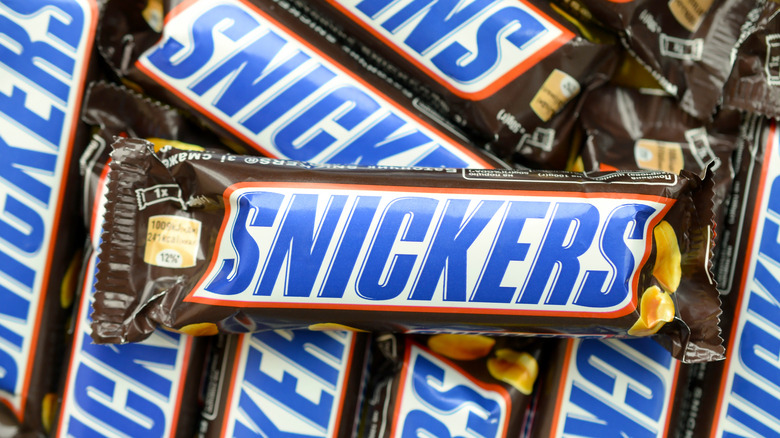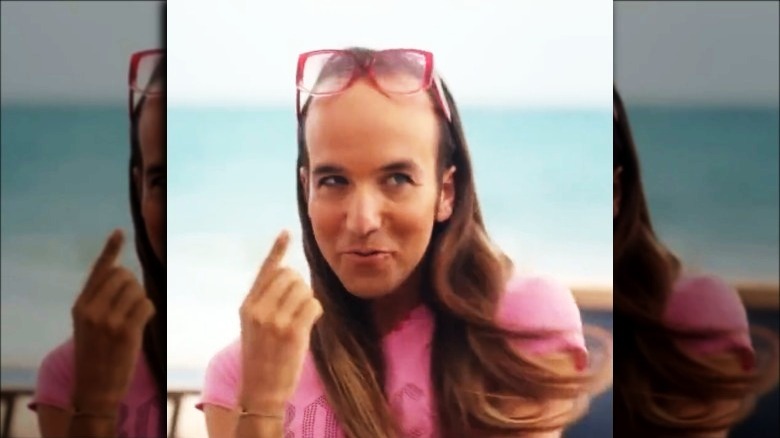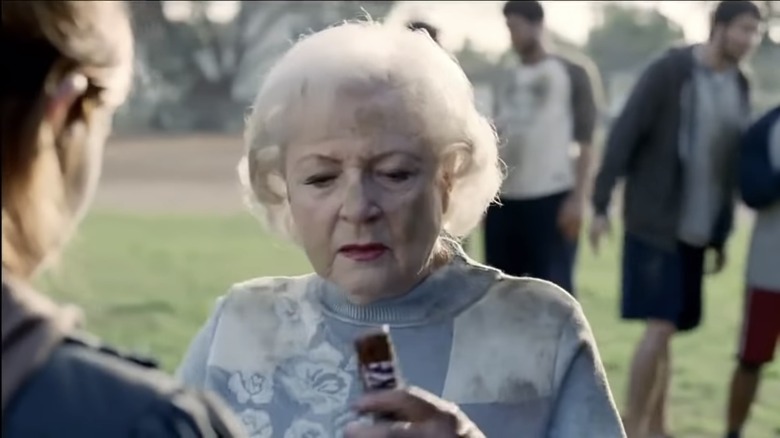Snickers Just Apologized For This Controversial Ad In Spain
Snickers was forced to pull a commercial and issue an apology to the LGBTQ community ... again.
Snickers has been riding the highly successful "You're Not You When You're Hungry" ad campaign ever since it launched during the 2010 Super Bowl with the famous "playing football like Betty White" spot. As Better Marketing observed, the new ad campaign reversed the fortunes of the chocolate bar brand, and it clearly worked better than Snickers' controversial 2007 Super Bowl commercial. Snickers' parent company, Mars Inc., decided to pull the 2007 ad after complaints from gay rights organizations (via CNN Money). That old commercial showed two mechanics accidentally kissing each other after chewing on the same Snickers bar. In order to cancel out the kiss, the two men declare they must "do something manly" and decide to rip out a clump of their own chest hair.
Ooh, did this commercial land badly. Critics said the ad promoted violence against gay people. Mars apologized, sort of. "We know that humor is highly subjective and understand that some people may have found the ad offensive. Clearly, that was not our intent," the company said at the time. "As with all of our Snickers advertising, our goal was to capture the attention of our core Snickers consumer."
The Snickers ad in Spain put feminine men in a bad light
The new Snickers campaign, launched with Betty White's help, was more successful for Mars, but it wasn't going to do anything to correct masculine stereotypes. Generally, the "You're Not You When You're Hungry" ads have the same theme, according to Better Marketing: Men risk losing their status among other men when they're hungry. Maybe it was inevitable that Snickers would apologize again.
The offending commercial this time around was a 20-second spot released in Spain (via Out). The ad, posted on Twitter by @gamomena, is titled "the beach bar" and shows an effeminate man with long hair and a high-pitched voice ordering a "sexy orange juice with vitamins A, B, and C." The man's friend and the waiter look at him strangely and offer him a Snickers ice cream bar. He transforms into his more masculine self, in what really is a variation on the Betty White-to-young-jock transformation in the original U.S. commercial. But this ad wasn't received favorably by LGBTQ groups in Spain. The Federación Estatal LGTB tweeted in Spanish, "It is shameful and regrettable that at this point there are companies that continue to perpetuate stereotypes and promote homophobia. If you need some training for next time, here we are, Snickers."
Since Betty White, Snickers ads have been based on masculine stereotypes
The Twitter user @gamomena, who posted the Snickers Spain commercial, found it offensive but referred to it not as homophobic strictly speaking but "plumófobo," which Out translated as "femmephobic." Call it what you will, the damage to Spain's LGBTQ community had been done. Snickers pulled the ad and issued an apology, also posted by @gamomena: "We take the rights of equality and inclusion very seriously and believe that anyone has the right to show themselves as they are. Therefore, we want to apologize for the misunderstanding that our new advertising campaign may have caused."
Admittedly, we're trusting Google Translate here, but "we want to apologize for the misunderstanding" sounds like, "We're sorry you didn't get what we were trying to do." In fact, Snickers goes on in its apology to explain itself: "In this specific campaign, the aim was to convey in a friendly and casual way that hunger can change your character."
What Snickers Spain is glossing over here is that its ad campaign hinges on a value judgment: Acting feminine is a change for the worse, the ad is saying. It's no wonder, really, since the Snickers campaign has been based on stereotypes about masculinity ever since Betty White (via Better Marketing).


